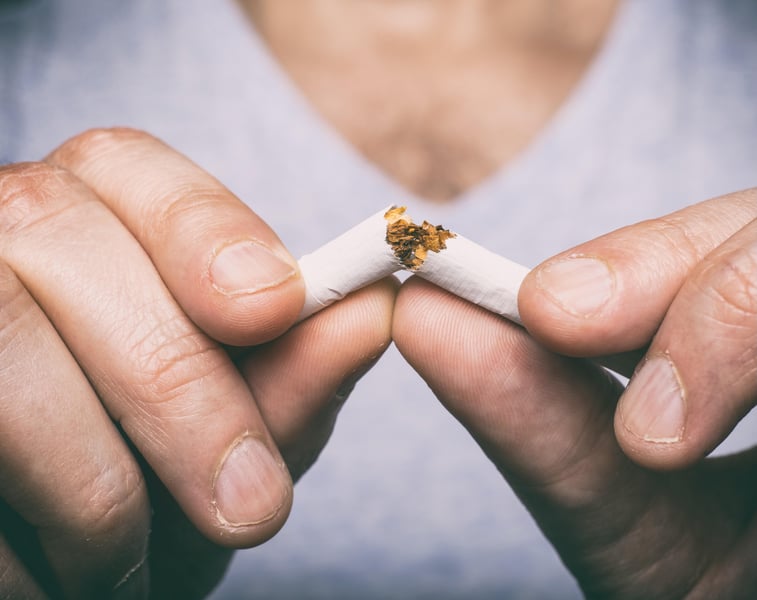Patient Resources
Get Healthy!
What Are Quit-Smoking Programs and How Can They Help You?
- January 4, 2023
- Steven Reinberg HealthDay Reporter

Sometimes it really does "take a village" to help you meet life's challenges, and quitting smoking can be one of the toughest challenges out there.
That's why specially designed smoking-cessation programs can make all the difference, experts say.
Many programs employ a combination approach, one that treats the physical and the psychological addictions you're trying to break.
Dr. Amit Mahajan, a volunteer medical spokesperson for the American Lung Association (ALA), says proven ways to help people quit often include professional counseling -- including psychotherapies such as cognitive behavioral therapy.
Such therapies are typically given alongside nicotine replacement patches and gums (to help ease cravings), and/or addiction-countering drugs, such as Chantix and bupropion (Wellbutrin).
Programs that offer up these combo strategies have a higher likelihood of success, Mahajan said.
"At the end of the day, the data is pretty clear that if there's behavioral therapy combined with pharmacotherapy medications, that is the best option for smokers who want to quit and people who've already tried and were unable to quit," he said.
Breaking free
The ALA offers up its own program, called Freedom From Smoking. First begun in 1975 and then updated and refined ever since, the program helps overcome the physical, mental and social aspects of addiction. It even offers up an online quiz that folks can take to confirm that they're mentally ready to try quitting.
People who use the program are six times more likely to be tobacco-free one year later, compared to those who try quitting on their own, the ALA says. When used in combination with cessation medications, up to 60% of participants report quitting by the end of the program.
The program keeps striving to improve the odds, the ALA added.
"All Freedom From Smoking products are reviewed and updated regularly to make sure Freedom From Smoking remains 'America's gold standard in smoking cessation programs,'" the group notes.
Some testimonials on the program's website highlight those who've gained freedom from smoking.
"The program was there when I was ready not to smoke," said 58-year-old Steven. "I had something to reach out for. Not to take away from the program's content or research, but I just wanted to give [smoking] up. I went to the program every week. I enjoyed that there were people to talk and to listen to. I even went to follow-up meetings and tried to give back [by helping] at the hospital."
Steven is not alone: Over the past 41 years, Freedom From Smoking has saved lives by helping hundreds of thousands of Americans end their addiction to nicotine, the ALA says.
Head to the program website to join an online program or to find an in-person program in your area.
Getting empowered
Smoking is the leading cause of the number one cancer killer, lung cancer. So it's no surprise that the American Cancer Society has its own online smoking cessation program, Empowered to Quit. It all starts out with picking your Quit Day (one hint: "pick a weekday that doesn't look like it will be too stressful of a day," the ACS says.)
"As your Quit Day gets closer, you can make your quit plan with the help of short emails from the American Cancer Society," according to the program's website. "Once your Quit Day arrives, you'll continue to receive tailored emails and tools to support you along your quit journey."
Then there's the highly successful Nicotine Anonymous, which follows the familiar 12-step, group therapy approach to kicking addictions.
Nicotine Anonymous even has its own newsletter, SevenMinutes. It shares "members' experience, strength, and hope," according to the program's website, and is "full of tips to help with cravings, suggestions of what has worked for others, and conversations about nicotine recovery."
Other great resources
The U.S. Centers for Disease Control and Prevention is investing in stop-smoking programs, too. The agency has partnered with the National Cancer Institute to launch the quitSTART phone app that "helps you quit smoking with tailored tips, inspiration, and challenges," according to their website.
It's also linked with the highly influential Tips From Former Smokers campaign, where people harmed by illnesses brought on by smoking tell of their journeys -- and try to help current smokers get motivated to quit.
In addition to seeking out these programs on your own, most states have quitlines that can tell you where you can find approved smoking cessation programs in your area.
Many hospitals and pharmacy chains also offer programs to help you quit. For example, CVS' Minute Clinics have smoking cessation programs you can sign up for online.
And if you're a veteran, the Veterans Administration has its own Quit VET and SmokefreeVET phone/text services that offer counseling (in person or over the phone) to talk about your tobacco use, ways to get tobacco out of your life, coping with triggers and changing your lifestyle to remain tobacco-free.

